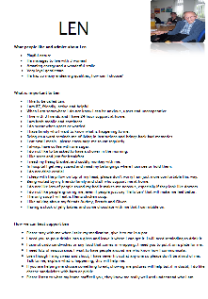How using a one-page profile in hospital can help medical staff support patients with learning disabilities, reducing anxiety for the person needing treatment and ensuring they get the medical attention they need.
Written by Tracie Gudgeon
Ninety year old Len lives with his three best friends who he has known for 60 years. Len has a mild learning disability and after spending much of his life in an institution he moved into a supported house.
With a fun sense of humour and a warm, affectionate disposition, Len is a well-loved member of his household. The limited contact Len has with family members makes his relationships with housemates and support workers all the more important.
Despite being in good health generally, Len recently became ill and was admitted to hospital for tests. After a couple of days on a ward Len’s wellbeing began to deteriorate. He’s stopped eating and drinking as he usually would and it was believed that his change in behaviour was because of the unfamiliar environment and people. The decision was made to send him home in the hope that he would feel more settled, but within a few hours of returning he was recalled to hospital after falling ill again.
It was then that a conversation took place with the Patient Liaison Co-Ordinator around the care Len was receiving whilst in hospital. It was obvious that although the Hospital Passport was being used, it didn’t contain the right information for the ward staff, doctors and specialists to know and understand who Len was and what individual support he needed. In response, Len’s team met and within a matter of hours produced a hospital one-page profile to ensure that Len would have the very best support during his stay.
Over the next few days Len remained in hospital but with the one-page profile at the end of his bed and sent electronically so that it could follow him around each department, medical staff understood Len and how to support him. Even the Consultant said ‘it was lovely to have a photo of Len when he was looking happy and well to see the difference in his appearance and understand how he should look.’
As someone that works to support Len, myself and the team firmly believe that the one-page profile helped in his recovery, meaning he was well enough to return back home to the people he loved much sooner. Len’s experience led to his housemates deciding that they too wanted a one-page profile, ensuring that if they went to hospital, staff there would know how to support them. We have been helping them to put these together. Using person-centred thinking tools, we have also completed a “Working/Not Working’ review with the people we support and shared this with the Patient Liaison Co-Ordinator at the hospital, who wanted to understand how she could further improve the hospital experience for people like Len.
Len is currently in good health, full of beans, and back making us all laugh. He is happy, in his own house, with his friends around him.

